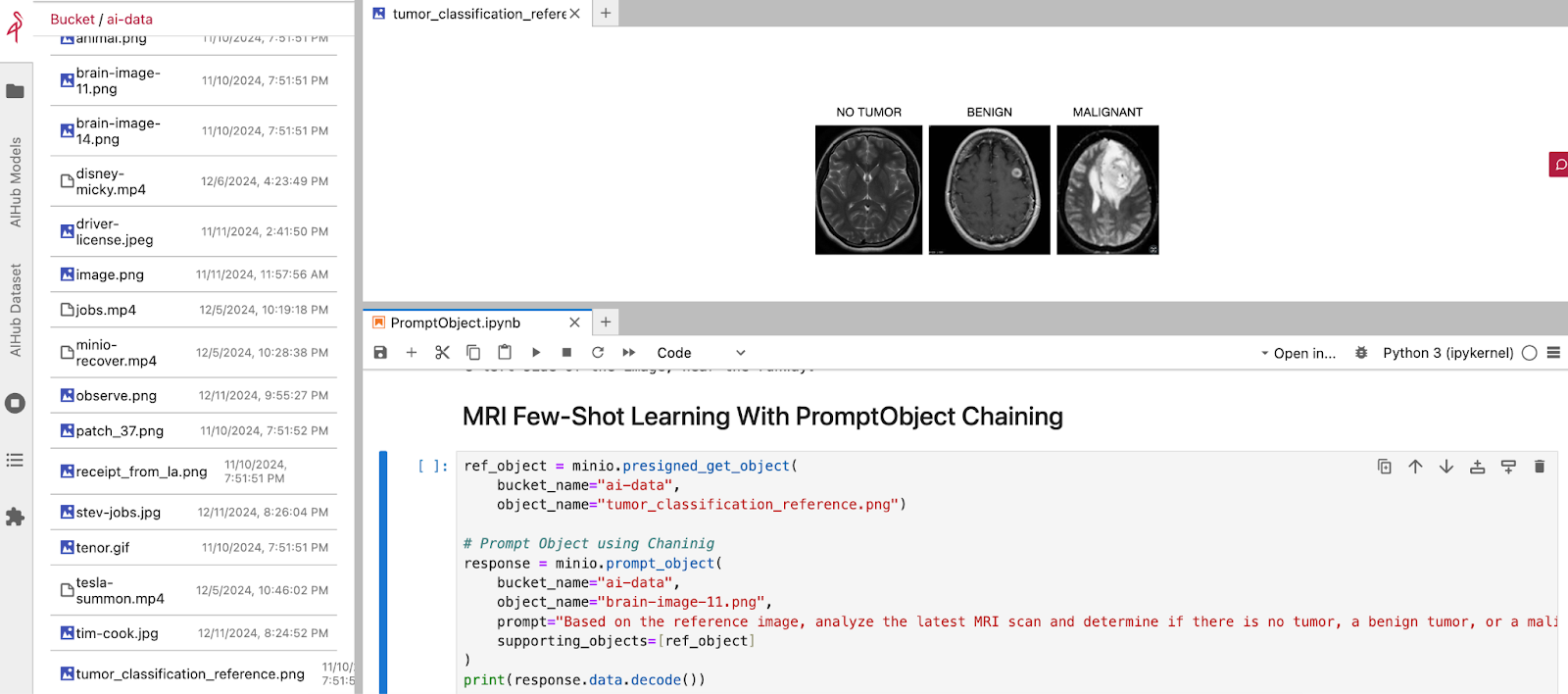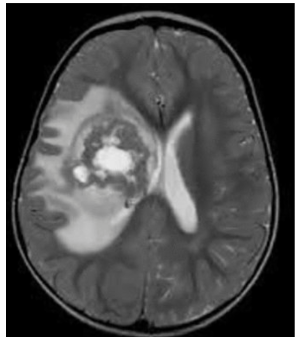Talk to Your Data: Transforming Healthcare with AI-Powered Object Storage

MinIO's Prompt API is now part of AIStor. MinIO was created to support massive datasets, including workloads exceeding exabyte scales, addressing challenges in memory, networking, replication, and load balancing and AIStor was created to build upon these capabilities and to address our customers’ AI use cases.
As part of AIStor, Prompt API advances this mission by enabling users to interact with unstructured objects stored in MinIO using natural language prompts. This means you can ask an object to describe itself, create structured data like JSON arrays from objects, or even perform complex tasks like summarization or translation.
In the healthcare sector, MinIO’s Prompt API transforms data management and analysis. By streamlining workflows and accelerating insights, it empowers organizations to unlock actionable intelligence, enhancing research, operational efficiency, and ultimately, patient outcomes.
Max Planck Case Study
MinIO has contributed to Healthcare in a significant way. The Max Planck Institute for Human Development faced significant challenges in managing large datasets, particularly MRI scans, which often reach tens of gigabytes in size. Traditional storage solutions proved costly and inflexible, prompting the institute to adopt MinIO. MinIO offered robust, scalable, and cost-effective storage with S3 compatibility, lifecycle management, and support for AI/ML workloads. This implementation served to accelerate the institute's research initiatives.
With the introduction of AIStor, this commitment is taken further by empowering institutions like the Max Planck Institute to innovate with AI faster, manage data more efficiently, and unlock new possibilities in healthcare research.
Key Features of the Prompt API
- Unstructured Objects: Supports a wide range of unstructured data formats, including text, images, PDFs, GIFs, videos, and more.
- Single or Multiple Objects: The promptObject API enables interaction with individual objects or multiple objects by using chaining. This allows users or applications to identify similarities, differences, or perform comparative analyses.
- Function Calling: Includes support for function calls, enabling the addition of custom logic and dynamic adjustments to the API’s behavior.
- Chained Functions: Chained functions allow the output of one promptObject API call to be used as input for the next, facilitating the creation of complex workflows. This modular approach enables multi-step operations on data objects within a single interaction, combining simplicity with versatility.
How it Works
MinIO runs a multi-modal LLM in the backend and takes care of everything. You don’t need to be an API expert to use Prompt API. You can use the GUI, the API or an SDK in any language you or your developers are comfortable with. A GPU is required to use Prompt API.
As always, AIStor can be deployed to any of the public clouds, but for increased confidentiality and data security AIStor and Prompt API can be deployed on-prem.
Healthcare Use Cases for Prompt API
Clinical Research and Data Analysis
- Accelerated Insights from Medical Records: Quickly identify patterns, trends, and anomalies in large medical records. For example, "Find all the similarities and differences between these medical records with patients with similar symptoms and treatment outcomes."
- Drug Discovery and Development: Analyze vast amounts of biomedical literature and clinical trial data to uncover new drug targets and treatment strategies. For instance, "Identify potential side effects of this drug based on historical data."
- Genomic Data Analysis: Analyze genomic sequences to identify genetic variations associated with diseases and predict patient outcomes. For example, "What genetic variants are described in this sequence file?"
Medical Imaging
- Automated Image Analysis: Automatically analyze medical images (X-rays, MRIs, CT scans) to detect abnormalities and generate diagnostic reports. For example, "For these MRI brain scans, give me 2 common attributes and 2 differences between the provided images "

In practice, this prompt would work by providing Prompt API a classification image like the below example.

Here is the code:
import os
MINIO_URL = os.environ['ENDPOINT_URL']
MINIO_ENDPOINT = MINIO_URL.split("//")[1]
ACCESS_KEY_ID = os.environ['ACCESS_KEY_ID']
SECRET_ACCESS_KEY = os.environ['SECRET_ACCESS_KEY']
import sys
import json
import time
from minio import Minio
from minio.commonconfig import Tags
minio = Minio(
MINIO_ENDPOINT,
access_key=ACCESS_KEY_ID,
secret_key=SECRET_ACCESS_KEY
)
ref_object = minio.presigned_get_object(
bucket_name="ai-data",
object_name="tumor_classification_reference.png")
# Prompt Object using Chaninig
response = minio.prompt_object(
bucket_name="ai-data",
object_name="brain-image-11.png",
prompt="Based on the reference image, analyze the latest MRI scan and determine if there is no tumor, a benign tumor, or a malignant. If there is a tumor, provide a brief description of the tumor's location and size",
supporting_objects=[ref_object]
)
print(response.data.decode())
And here is the output from AIstor:
Based on the latest MRI scan provided, there is a tumor present. The tumor appears to be located in the left hemisphere of the brain, near the center. The size of the tumor is relatively large, occupying a significant portion of the left hemisphere. The tumor has a heterogeneous appearance with areas of high and low signal intensity, suggesting a complex structure.
Patient Care and Management
- Patient Surveys: Measure patient satisfaction with medical professionals accurately. For example, “Which of these patient surveys include non-clinical factors of wait times and office staff behavior.”
Healthcare Administration
- Streamlined Data Management: Automatically categorize and organize medical records, claims, and other healthcare documents. For example, "What is the diagnosis of this medical record?”
- Fraud Detection: Identify potential fraud and abuse by analyzing claims data and identifying anomalies. For example, “Is there any inconsistency or difference between the claimant’s address and the location of service?”
Empowering Healthcare Professionals
MinIO's Prompt API represents a significant leap forward in how you can interact with unstructured healthcare data. By combining the power of natural language processing with the scalability and reliability of MinIO's object storage, the Prompt API simplifies complex data workflows, accelerates insights, and enhances patient care.
Whether analyzing medical records, comparing imaging scans, or supporting clinical decision-making, this innovative API empowers healthcare professionals to unlock the full potential of their data. As the demands of modern healthcare evolve, the Prompt API stands as a critical tool to bridge the gap between raw data and actionable knowledge, driving better outcomes for patients and providers alike.
You'll need an AIStor subscription to get started. If you’re an existing customer and would like to use this functionality, please reach out to us on Slack or at hello@min.io.






